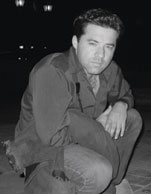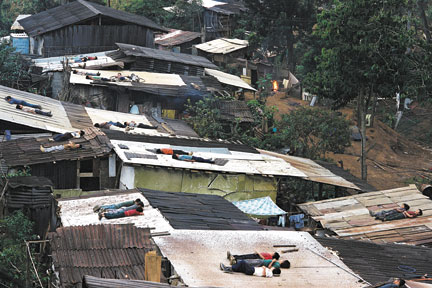December
2005/January 2006
Fighting
for Innocence
The Satya Interview with Oscar
Torres
|
 |
Oscar Torres |
For most kids, 12 is an awkward age, but for kids
in El Salvador during the nation’s civil war, turning 12 was frightening. At this age,
boys were forcefully recruited into the government’s army or,
with no other choice, were swept into the guerilla forces. Children
were separated from their families and became victims of a war they
did not start. Based on screenwriter Oscar Torres’s childhood
in El Salvador, Innocent Voices, directed by Luis Mandoki, captures
the spirit of these children in their last days of innocence.
From the vantage point of an 11—turning 12—year-old boy, the film
portrays a community caught in the cross fires between government and guerilla
combat. Children cry themselves to sleep at night, hiding under their beds when
gunshots fire through their homes. We witness military raids of a school where
young boys are abducted into the army. While the film depicts scenes no child
should endure, Innocent Voices beautifully portrays these children as children.
With the joys of young love, the creativity of childhood games, and the defiance
of authority, these children fiercely hold on to their youth. Listening to the
banned rebel anthem, “Casas de Carton” (“Cardboard Houses”),
and hiding on rooftops evading recruitment, kids subtly reveal their resistance
to war and also their innocence. The film has received accolades from numerous
film festivals and was Mexico’s submission for the 2005 Academy Awards.
In 1985, Torres fled El Salvador at the age of 14 and came to the U.S., where
he was reunited with his family several years later. Writing this film was an
emotional personal journey. While the film shares his experiences from El Salvador,
Innocent Voices speaks universal truths. The UN estimates more than 300,000 children
are used by armies throughout the world. Since children are impressionable, their
youth is often exploited to mold the perfect obedient soldier. And wherever there
is war, children are vastly and deeply impacted.
For Torres, when it comes to children, there should be no borders, and he is
committed to advocating on their behalf. Oscar Torres shared with Sangamithra
Iyer his warm, honest, and compelling voice for peace.
What prompted you to write this film about your childhood many years after you
left El Salvador?
It was a series of things. [Soon] after September 11, 2001, I heard the song “Casas
de Carton,” which is a song my uncle sang to me when I was [a boy], and
I think that triggered something in me. There was a sense of war again in my
life that I hadn’t felt since I left my country in 1985.
I heard the song again in October, and by that point it was clear to me that
I needed to tell the story of this song that had changed my life so much, growing
up listening to it in a secret way. It wasn’t that I wanted to tell the
story of my life. I had to be convinced and actually open up to that.
And then it became more of a personal journey?
Yeah. Many times, I thought, if I knew [writing about] it was going to get this
hard I would have never started. I had little glimpses of [my life] in the original
script—the rooftop scenes and us walking with the soldiers—but it
wasn’t in depth. People read the script and they kept saying the same thing.
We want to know more about the boy—what happens to the boy? The director,
Luis Mandoki, was no exception to that.
 |
Young boys hiding on rooftops, evading military recruitment.
Photo still courtesy of Innocent Voices |
As someone who was exposed to war at an early age, can you talk about your own
journey in healing from these traumas?
I can tell you that talking to you like this wouldn’t have been the same
two years ago. I would have already broken down on the phone. Now I don’t
break down. The love, heart and soul we all started with are [still] there, but
the healing has taken place. Which means I don’t talk to you from a
victim point of view anymore. I talk to you as someone who has discovered
a lot of power
in himself, but not power over anyone. I think the healing is complete in
a lot of ways, but I never want to heal completely. I never want to stop
being sensitive
to it. At the same time, I want to lead a healthy life because I know that
in doing so, I can maybe help a little bit further.
The healing process was very hard. The first time I heard the song again,
I had such overwhelming feelings with all the memories flashing back. It
was an [emotional]
roller coaster, tears and crying, panic and anxiety attacks. At that time,
I hadn’t connected the two. I thought I was going through some really
bad things and stress in my life.
Sometimes I would be okay and all of a sudden I would get this anxiety inside
of me, and I could hear the soldiers’ boots marching. I had a lot of anger
and fear. I awoke all of this in me when I sat down to write [about it]. Even
with Luis, as we were working on the rewriting of the script, there were times
that I just got so furious with him pushing me. I didn’t want to tell him
about the scene when we were at the river and I was about to shoot that soldier
boy. He got really upset and stormed out. He left and I broke down, and then
he came back and said ‘okay, tell me about it.’ There I was crying,
and I had my laptop and started writing while crying at the same time. That’s
how a lot of those scenes [were written]. I feel that the reason why [the
film] reaches people is that, in a way, the moment that happened while it
was being
written and remembered is in those scenes as well.
One of the things you mentioned at a lecture at the Open Society Institute was
that while these children are sent to fight and robbed of their innocence, they
are also fighting for their innocence. Can you expand on that?
I think we were battling the war with the innocence, with the games we played
and the fantasies we created around it. The challenging of curfew, for example.
The challenging of recruitment, hiding on those rooftops. We found ways to still
be children and use our childlike behavior to combat that and try to keep our
innocence alive.
What has the response been to the film so far, in this country and in El Salvador?
The people embrace the film, like nobody has ever seen anything like it.
It stayed in theaters for over three months in El Salvador. People found
ways to get it,
and of course pirated it. While it was still playing in theaters, schools
were already playing it to students. Now it has become part of the educational
program
in [some] schools in El Salvador. Also, in Mexico, some colleges and universities
adopted it as part of their Latin American history programs. Now here in
the U.S., there are very similar things. I’m doing a lot stuff for
schools and colleges in the next few weeks.
Speaking of schools, how do you see the U.S. government and its tactics in recruiting
children in our public schools? Do you find parallels with what is going on here
and your experiences during your childhood?
Absolutely. [There’s a clause] connected to the No Child Left Behind Act
that [allows] army recruiters to have access to telephone numbers and home addresses
of children—14, 15, 16 year-olds. They are able to call them and start
recruiting at this age. It is a very military era.
I don’t have children yet, but I can imagine what I would feel about
the possibility of my child getting recruited to fight in an army. This is
happening
to so many kids and so many parents. It is a waste of my life to not do something
[about child soldiers] and it is a blessing that I have the opportunity to
do so.
The film suggests how complicit the U.S. government was in funding and training
child soldiers in El Salvador. It makes one wonder how much we are involved with
the children presently in conflict around the world?
The Pentagon released a report saying that the number four problem that U.S.
soldiers are having is child soldiers. And one of the first U.S. soldiers that
went down in Afghanistan was killed by a 14 year-old boy.
It is a very present thing for the U.S., and not only are they refusing to do
something about it, they are starting to do the same themselves. It makes you
wonder how important it really is for them.
How can people get involved and help the children caught in conflict throughout
the world?
Well, in the U.S., they should start here. I think first you start with yourself,
your family, and then you can go further to your community, country, and then
the world.
I think that if they would just raise their voices against child recruitment
in this country, then we can really make some noise in the world. Mothers,
for example, can get involved with leavemychildalone.org.
But this country doesn’t take anything personal unless it is happening
here. The bottom line is these governments that preach against terrorism, are
creating terrorism by going to war. I think war is the laziest and easiest way
of governing. It’s easy to take life, but it is not easy to give or
maintain a life.
I really question how much we want peace. The countries involved in this
don’t
really care about peace, they never have. If we really want peace, we have to
start young. We have to start with children. And we have to set an example. I
learned compassion from my mother’s example. She didn’t teach it
to me through words as much as she did with actions—helping a wounded
soldier outside of school after they put us in danger at a school shooting.
That showed
me compassion. I followed that.
How can we help children caught in war to heal?
Love. Somebody needs to have enough love for this child and not give up on
them. It took time for me. I opened up to Luis because he had the patience
and wanted
to provide a place for me to feel safe—to feel that he wasn’t
going to use this against me. That is our reaction. We live very defensively
after
[situations like] this and everything is conflict and enemies. You strike
before they strike you. But you [need to] show love and enough patience.
It comes from
an individual place. One at a time.
When you have a country like the U.S., that has no patience for anything, how
are the children here supposed to learn about peace? We have to start with
us.
To learn more about the film visit www.innocentvoicesmovie.com. To find out
more about child soldiers see www.child-soldiers.org. To help stop military
recruitment
in U.S. public schools go to www.leavemychildalone.org.


